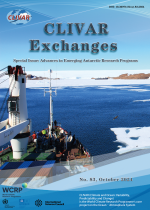PRP telecon organized in June 2022

The CLIVAR Pacific Region Panel (PRP) held a telecon on 2 June 2022, mainly for sharing updates on various activities by PRP members, discussing the SSG feedback to the PRP annual report and the possible options for the next PRP in-person meeting. Ten PRP members and Jing Li from ICPO attended the telecon.
Dr. Cristian Martinez-Villalobos from Chile is a new member recruited by PRP in 2022. He has two main lines of research: one is on extreme events, focusing on precipitation extremes and global warming; the other is on ENSO and ENSO asymmetry. All other members also shared their background and research interests.
PRP members then introduced the panel activities they are currently involved with or are leading. Dr. Fan Wang from IOCAS, China, provided updates on the Northwestern Pacific Ocean Circulation Experiment (NPOCE), with particular focus on the new term (2022-2025) of the Scientific Steering Committee (SSC) of NPOCE; the NPOCE webinar series; the 4th Open Science Symposium and the field experiments led by IOCAS.
Dr. Sophie Cravatte briefed the panel on the 7th TPOS2020 Steering Committee meeting, by highlighting the achievements and challenges of TPOS2020, describing the new TPOS governance and implementations, as well as the top issues that need to be addressed and their priorities. The new website of TPOS is www.tropicalpacific.org. PRP members were interested in knowing the plan for removing the moorings in the central Pacific, the approaches to evaluate the impacts of different components of the observing systems on model forecasts, and the plans for off equatorial observations that could capture the signal for the long-lasting La Nina events, like the one we are currently experiencing.
Dr. Antonietta Captondi and Dr. Sophie Cravatte updated the panel about the upcoming workshop titled ‘From global to coastal: Cultivating new solutions and partnerships for an enhanced Ocean Observing System in a decade of accelerating change’, which will be organized across CLIVAR panels, from 15-17 August 2022 in Trieste, Italy and online. PRP members were encouraged to register and attend the workshop, as this is a good opportunity for cross-panel interaction on ocean observation.
Dr. Antonietta Capotondi also briefly described the organization of the upcoming 3rd Summer School on Theory, Mechanisms and Hierarchical Modeling of Climate Dynamics: Tropical Oceans, ENSO and their teleconnections, 18-29 July 2022, Hybrid, with 30-40 expected in-person students in Trieste, Italy and other students online.
Updates on the two PRP working groups, i.e. the ENSO Conceptual Model WG and Tropical Pacific Decadal Variability WG, were also introduced by Antonietta. Most PRP members are currently involved in either or both WGs. Both WGs are in the stage of preparing review papers, by summarizing the current state of knowledge on the two topics and highlighting the open questions that should be further addressed in the future. It was suggested that to go beyond the review papers and try to motivate future research by advertising their activities among the broader community and inform the funding agencies of the key open research questions.
Dr. Andrew Wittenberg briefly reviewed the progress of ENSO metrics, by highlighting the future directions on cross-metrics interaction and correlation, as well as model analogue pairing with observations for making ENSO forecasts. PRP is open to the suggestion from CLIVAR SSG to consider applying ENSO metrics to initialized predictions and to evaluate how the ENSO properties change as a function of lead time, while the model drifts to its own climate, an activity that could be linked to the WCRP LHAs on EPESC and Digital Earths.
Dr. Shayne McGregor presented the take-home messages from CLIVAR SSG for the PRP to focus on moving forward: to devise specific plans for capacity building, by involving ECS and scientists from Global South; to build connections with other panels/WCRP lighthouse activities/partner projects; and to avoid overlaps between the TPDV WG, ENSO Conceptual Model WG and TBI RF. All of them were well taken by PRP and will be considered in the panel's future activities.
Two options were proposed for the next PRP in-person meeting: Option1: alongside the 2022 AGU Fall Meeting in Chicago, USA in December 2022; and Option2: alongside the AMS meeting in Denver, USA in January 2023. The second option would allow the organization of a mini TPDV workshop in Boulder, CO, USA, but the dates of the meeting may be challenging for several members. In general, uncertainties remain about the ability of several members to leave their countries and travel to the USA, due to covid-related travel restrictions that may still be in place in December 2022, January 2023.













